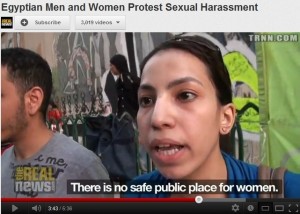Trigger Warning
I am devastated by the enormous number of mass sexual assaults – when one is too many – that have occurred at Tahrir Square over the last few days. This is unacceptable. To learn more about what’s happened, and the brave people who are working to keep women safe, here are a few of the many recent news stories:
* Guardian, “80 sexual assaults in one day – the other story of Tahrir Square“
* The Daily Beast, “Egypt’s Plague of Sex Attacks“
* Your Middle East, “Almost 100 women sexually assaulted in Cairo, says HRW“
* MSNBC, “As Egyptian unrests grows, sexual assaults rampant“
* Think Progress, “How Activists Are Fighting Back Against The Egyptian Revolution’s Sexual Assault Problem“
* Al Jazeera, “Women sexually assaulted in Egypt protests“
* The Irish Times, “Guest post: On the ground in Egypt“


